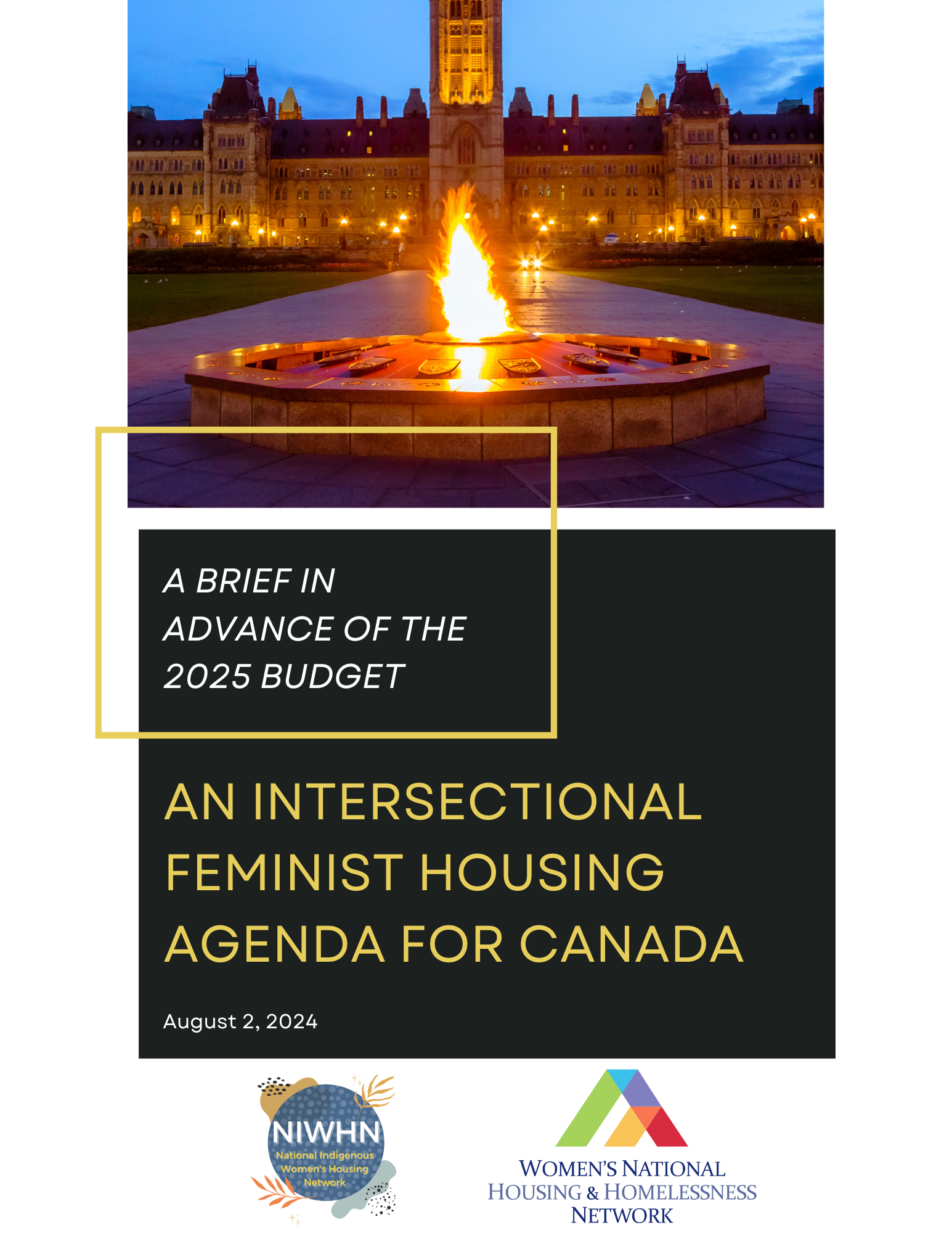The National Indigenous Women’s Housing Network and Women’s National Housing and Homelessness Network submitted a pre-budget submission brief for the 2025 federal budget.
 With significant leaps made within the past several years to recognize housing as a crisis across Canada, we fear that few understand that the crisis cannot be solved unless it is understood as a gendered crisis. With the historic adoption of the National Housing Strategy Act in 2019, and the upcoming National Human Rights Review Panel on Government’s Failure to Eliminate Homelessness for Women and Gender-Diverse people, Canada is at a critical juncture. At this juncture, rights-informed and gender-responsive commitments and directions can lead to transformative impacts on the state of housing for women and gender-diverse, often overrepresented in core-housing need and impacted by the most egregious housing rights violations.
With significant leaps made within the past several years to recognize housing as a crisis across Canada, we fear that few understand that the crisis cannot be solved unless it is understood as a gendered crisis. With the historic adoption of the National Housing Strategy Act in 2019, and the upcoming National Human Rights Review Panel on Government’s Failure to Eliminate Homelessness for Women and Gender-Diverse people, Canada is at a critical juncture. At this juncture, rights-informed and gender-responsive commitments and directions can lead to transformative impacts on the state of housing for women and gender-diverse, often overrepresented in core-housing need and impacted by the most egregious housing rights violations.
The need for a transformative departure from the status quo is more urgent than ever. Our recommendations for Budget 2025 call on the federal government to ground upcoming budget investments in a transformative right- and gender-based approach, not only to ensure women and gender-diverse people’s right to safe and secure housing, but also their right to a life without harm and violence.
On August 2, the Women’s National housing and Homelessness Network with our sister network, the National Indigenous Women’s Housing Network submitted a pre-budget brief in advance of the 2025 federal budget.
In Budget 2024, we saw an array of commitments bearing promise and prospect for women and gender-diverse people experiencing housing insecurity but without strong intersectional gender- and rights-based implementation, many of those commitments will not lead to any transformative impacts on lives of women and gender-diverse people experiencing housing insecurity and homelessness.
Based on previous analyses conducted by various organizations, experts and human rights bodies, investments made through programs under the National Housing Strategy lack the appropriate funding and policy levers required to meet the Strategy’s own goals of reducing core-housing need in half or eliminating chronic homelessness. This is particularly distressful as budget after budget, including the Canada Housing Plan 2024, commit substantial investments to funds that are known to have little to no impact lifting the most vulnerable households out of core housing need.
The recommendations below emphasize the importance of implementing human rights-based measures with clear goals and timelines, ensuring gender-specific allocations, and tightening protections for tenants, along with investments in creating non-market housing supply that can sustain deeper levels of affordability. As echoed in the Intersectional Feminist Housing Agenda, “our housing ecosystem needs a diversity of solutions, led and designed by those most impacted, and based in human rights and gender-sensitive approaches. Research consistently shows that the private market – on its own – will not provide affordable and safe housing for poor women and gender-diverse people, especially if they are Indigenous, racialized, have a disability, or are single parents.”
Recommendations:
- Invest an additional $3 billion per year in the Urban, Rural and Northern (URN) Housing Strategy.
- Increase funding for homelessness programs to $3.5 Billion per year with clear human rights goals, targets and timelines to eliminate all forms of homelessness.
- Commit to building at least 50,000 social housing units per year over the next 10 years, supported by an accelerated and sector-led launch of the Canada Rental Protection Fund.
- Expand and test the GBA+ framework to ensure substantive equality across all housing programs and establish an oversight mechanism to track progress within clear human rights and gender-specific goals and timelines.
- Transform Renters Bill of Rights to the National Tenant Rights Standards which serve as minimum national standards for tenant protections, including strong rent and vacancy controls.
- Increase the Canada Disability Benefit amounts that meet the needs of individuals living with disabilities and lifts them out of poverty with dignity.
The recommendations are built off of our Intersectional Feminist Housing Agenda we shared with the Minister of Housing in December 2023. The Agenda, to date, has had over 100 endorsements from national organizations, regional groups, advocates, scholars, grassroots organizers, and individuals from across Canada.

